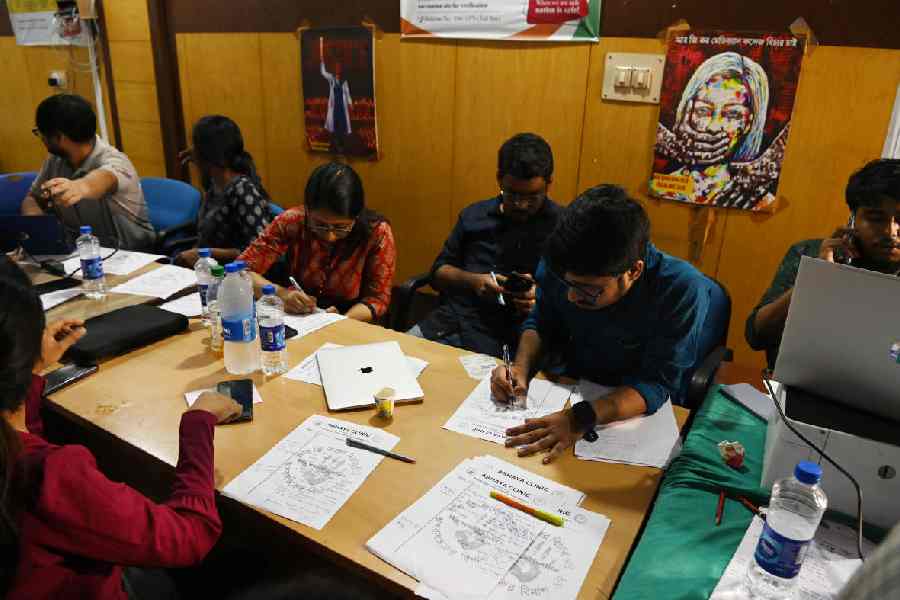At least seven people, including a newborn girl, died after failing to receive treatment at government hospitals affected by the junior doctors’ cease-work, health department officials claimed on Saturday.
“We have found that at least seven patients who did not get treatment at government medical colleges — some of them went to other facilities — have died,” a senior state health department official said.
He did not provide details but said the department had “verified” each of the seven deaths and the circumstances in which they happened.
Health department officials said at least 5,000 scheduled surgeries had been cancelled across the state’s 26 government medical college hospitals because of the agitation, which started on August 9 after the rape and murder of a junior doctor at RG Kar Medical College and Hospital.
The junior doctors said on Saturday that their cease-work would continue.
“An average of 400 elective surgeries used to take place daily at the government medical college hospitals, but the figure has dropped below 100 since the cease-work began,” a health department official said.
“Around 5,000 elective surgeries had to be cancelled because of a shortage of doctors.”
The Telegraph had on Friday reported that nearly seven lakh patients had been denied examination or treatment at the OPDs in Bengal’s government medical college hospitals since August 9.
The cease-work has hit many patients and their families in the pocket.
A man from North 24-Parganas said he had to take a loan to get an ovarian cystectomy done on his 28-year-old wife — an operation that would have cost nothing at a government hospital.
The 29-year-old husband has been working at a private firm for only a few years and has barely any savings.
“We wanted to get the surgery done at a government medical college but because of the cease-work, we decided to go to a private hospital,”
the husband said.
The couple had hoped that Swasthya Sathi — the state government’s health insurance scheme — would take care of the cost. But the hospital officials said that in case of gynaecological procedures, the scheme’s benefits were not available to women aged below 40.
“The estimated bill is around ₹75,000 and I had to take a loan. The doctor had said the surgery needed to be done immediately,” the husband said.
At government medical colleges in Calcutta on Saturday, many patients were denied admission or asked to come back another day. Many were redirected to another government teaching hospital — with full knowledge that these too were affected by the strike.
A five-year-old boy with kidney stones and an elderly woman who had suffered a stroke were refused admission at SSKM, while a man with a stroke was sent back from Medical College Kolkata.
“My son has been diagnosed with kidney stones. He was under treatment at ESI Joka for four days. This morning, the doctors there told us his treatment was not possible there any longer,” the boy’s father, Dilip Mukhi, a Jamshedpur resident, said outside the SSKM emergency ward.
“We were referred to SSKM Hospital, but the doctors here told us to come to the OPD on Monday. Whether he will be admitted will be decided after the OPD check-up. We have to wait here till Monday to learn whether or not my son will be admitted.”
Brishpati Haldar, 65, lay on the road outside SSKM Hospital’s emergency ward on Saturday. She had suffered a stroke.
“My mother-in-law is partially paralysed. We came to the emergency ward at 11am. The doctors at the emergency asked us to do a CT scan,” said Sutrishna Mondol, daughter-in-law of Brishpati and a Garia resident.
“When we came back with the report, they asked us to visit the OPD, but we were told at the OPD that there were no doctors to treat her.
“At the OPD, we were also told to take her to Calcutta National Medical College and Hospital. I don’t know whether she will receive proper treatment there, either, because of the present situation.”
Khokon Haldar, 58, a resident of Dhapa who had suffered a stroke, was turned away from Medical College Kolkata. The family was told to take him to SSKM Hospital.
“We came to the emergency ward (at Medical College Kolkata) this morning but after the CT scan was done, we were told that doctors were not available to treat my father. They referred us to SSKM Hospital,” said Ronojit Haldar.
Telemedicine clinics
Postgraduate trainee doctors at RG Kar organised a telemedicine clinic, christened Abhaya Clinic, on Saturday and tried to send the message across that they were not turning their face away from patients.
But there were doubts whether telemedicine clinics could be an effective alternative to physical examination at OPD clinics.
One telemedicine clinic at one hospital cannot make up for the absence of junior doctors at OPD clinics across so many medical colleges, anyway, a junior doctor admitted.

